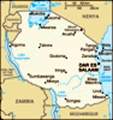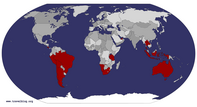Advertisement
Published: June 26th 2006
There are a few common Kiswahili Proverbs that go like this:
'Haraka haraka haina baraka', which means: In hurry, hurry there is no blessing.
'Pole Pole ndiyo mwendo', translated to: Slowly, slowly is indeed the proper path.
And my favorite - 'Kawia ufike': Be late...but get there.
At first read, these may elicit a little chuckle...but after a few days in east africa, you begin to realize the true nature of their origin and their infinite wisdom at summing up the rhythm of the African timetable.
After leaving victoria falls, i traveled across the zimbabwe-zambia border into vic falls' twin town of livingstone. after a brief and uneventful day and night in livingstone at jolly boy's backbackers (convenient, fun and clean..and will coordinate your zambian visa free of charge with package stay, complete with border pick up if you call them in advance), i continued traveling north into the capital of lusaka, and finally into the coastal city and sudo capital of dar es salaam, tanzania. it was a good lesson in solo african overland travel, consisting of a patchwork string of local bus journeys, allowing plenty of time to take in the changing scenery, get
to know my fellow passengers, and perfect the strategic timing of bathroom breaks and food stops.
the longest overhaul was from lusaka to dar on a crowded, worn-in, passenger bus. being one of the few women passengers, and definitely the only "mzungu" (white foreigner), i had the pleasure of sitting next to a friendly girl who was about 27 and making the trip from lusaka to dar for business. this was a journey that she takes once every week to buy electronic and mechanical equipment in dar to bring back and sell to suppliers in lusaka. we got to know each other over the next day and a half (logging 30 bus-hours in total!) and chatted about music, boys, and life. she was also a crucial and helpful companion in navigating the random food and bathroom stops, where for 10 minutes the bus pulls into a dusty 'rest stop', that conjures images of a present day 'wild west'.. missing only the billowing tumbleweed and stetson sporting cowboy. as the bus wheezes and jolts to a stop, 40 or so passengers tumble out to make a quick trip to the facilities (generous way of describing roomed holes in the floor

 old arab mansion
old arab mansion
many of the historical buildings in stonetown are wearing down, but still convey the stature and beauty of the sultans empirewhere the challenge is more about getting in and out without touching anything. clorox would have a field day here!) and load up on fried chicken, chips (fries) and coke, which are dished out in plastic bags that you then bring back on the bus and devour from your lap with your hands. a 30 hour marathon for the arteries, but as the only nourishment option, i chalked them up to fun and different communal mealtimes. at least they did the trick in appeasing the hunger pangs.
after a quick night in the dusty and bustling center of dar (the coastal beaches are definitely the place to pass time here), i found my way to the ferry port, managed to traverse through all the hagglers and "helpers" without expending all of my energy and resolve, and booked a 2 1/2 hour boat ride over to the infamous island of zanzibar, where promises of white sandy beaches and crystal blue waters awaited. the 'first class', mzungu fare of $20 provided seating in an enclosed room in the center of the boat. my only fellow passengers were a cute English couple who were finishing up the last few weeks of a

 slave market holding area
slave market holding area
recessed deep under the angelican church in stonetown are two historic holding areas used to house up to 50 or 60 chained slaves at the peak of the slave trading. they were kept in these dark, cavernous, musty holes for days until brought to market. many died of disease and suffocation. 7 month journey. we were the only 'mzungu's' in the compartment and bided the time on big leather couches, while toggling between the two tv channels replaying spotty tanzanian soap opera episodes, home made swahili music videos and a 24 hour muslim prayer channel. as a prime example of the above proverbs, our 2 1/2 hour journey was unfortunately stretched into an agonizing TEN, due to 'engine failure' that limited the ferry to a methodical and painfully slow pluggish-crawl across the grayish waters.
with our destination of zanzibar in full site for most of the trip, one's mind passes through many stages of uncomfort, frustration, anger, bordem and resignation. i contemplated jumping and making the swim more than once. especially after the ferry's kitchen had run out of all the fried chicken, leaving only soggy chips and a flourescent orange sugary liquid substance as culinary options. as i have learned in the weeks since, you will drive yourself mad trying to fight the random pace and in congruent scheduling of african transit and business dealings.....so we collectively resolved to readjust our expectations and start singing along to the swahili version of MTV (which was heavily weighted with a basement
version of rap / R&B that i later learned is popularly known as "bongo flava") as has usually been the case, the long journey and extended hours of patiently waiting on our bums, was quickly trumped and easily forgotten by a good warm shower and comfy bed in a cute stonetown, arabic-style guesthouse.
As one of the leading tourist destinations for Tanzania, the paradise island of Zanzibar not only offers a secluded respite from the dusty and busy mainland cities, but is also seeped in historical significance as the original capital of the Arab Empire in East Africa and former trading capital for ivory, spices, and ivory. Afloat in the Indian Ocean and a short (or long...depending on your engine) ferry ride or flight from the Tanzanian coast, Zanzibar was originally founded by the Arabs in the 8th century and over the next hundreds of years has seen Assyrian, Sumerian, Egyptian, Indian, Persian, Portuguese, Arab, Dutch, and British influence.
Stonetown, the islands main city, is a winding maze of small, narrow, cavernous streets with towering white washed, walled corridors. the stores, homes, and restaurants are encased in the interior spaces. All are marked by huge, beautifully ornate and

 living in harmony
living in harmony
90% of zanzibar is muslim, the other 10% being a mixture of christian and skih. this is a picture of the anglican church spear, with muslim mosque on the left. colorful wooden doors, flush with the outsides walls, and adorned with brass hinges, knobs, and intricately inlaid artwork. the street stalls and small shops are overflowing with fresh fish, local dishes, grilling skewers of meat, warm chapati, breaded vegetables, roasted peanuts, artisan products and a collage of random necessities, such as batteries, soap, drinks, candy, cigarettes, phone cards, and produce. one can stay busy for at least a few days wandering through the city streets (getting lost is as easy as tripping...but doesn't last long, as eventually you find yourself right back where you started from), watching the fisherman float about 20km off the shoreline in their small wooden dhows, exploring the curios and trying on the colorful kangas (beautiful and colorful cotton sheaths of fabric worn by the women as skirts, dresses, or scarves)
a trip to stonetown is not complete with out a local tour of the spice plantations, which provided most of the world's supply of rich spices, including clover, vanilla, Cinnamon, cardamon and nutmeg. Mr. Miti has the lock on the spice tour market, and for 10,000 shillings, he will organize a full day guided tour just a few kilometers outside of stonetown, pointing out

 wooden dhows
wooden dhows
fisherman use the dhows to catch live fish, lobster, and crabslocal fruit, trees, spices, and flowers that all flourish in the tropical climate. the village children often serve as loyal accompaniments, creating impromptu bracelets, rings, and necklaces out of the leaves and plants. the spice plantations are currently still active, however only service local markets, with a modest amount of cloves being the only spice to remain on the export list.
the main drawn to zanzibar are the miles of milky beaches that encircle most of the northern and eastern coasts. i spent the rest of the week in the low-key north-eastern beach town of kwenda, just south of the more popular nungwi area. there is something blissfully soothing about warm, salty ocean waves and pristine, white, sandy beaches. holed up in a little beach bungalow at kendwa rocks, the days were spent exploring the surrounding reefs, which were living and breathing scenes from the little mermaid. colorful fish and brilliant coral were abundant.
it was easy to find fresh fish dinners and local fare each night, served in open air restaurants with the ocean as a backdrop and warm salty breeze and rhythmic beats of local reggae creating an nourishing atmosphere. the high tourist season of june,

 daily view
daily view
taking in the sun and sand from the cabana bar at kendwa rocksjuly and august, was just starting to set in, so the socializing was supplemented by a nice mellow and friendly mix of locals and visitors from across the globe, all enjoying a few days of relaxation and rejuvenation.
if you find yourself on zanzibar in the future...make sure not to leave without a nighttime dip in Indian Ocean. you'll be pleasantly surprised and entertained with an "impromptu" electric light show that emanates from the warm, dark current. the dark waters are accented by the moonlight and a lined horizon of lone mast lights, the sole sign of the patient work of the traditional fisherman, waiting for their nightly catch.
feeling revived and re-energized and not wanting to tempt my "ferry" fate again, i found a cheap and direct flight from Zanzibar into Kilimanjaro Airport, where i would begin my volunteer project in the northern tanzanian town of arusha!
Advertisement
Tot: 0.163s; Tpl: 0.016s; cc: 11; qc: 57; dbt: 0.1299s; 1; m:domysql w:travelblog (10.17.0.13); sld: 1;
; mem: 1.2mb












rick
non-member comment
paradise
sounds like paradise.. except for the ride over :0